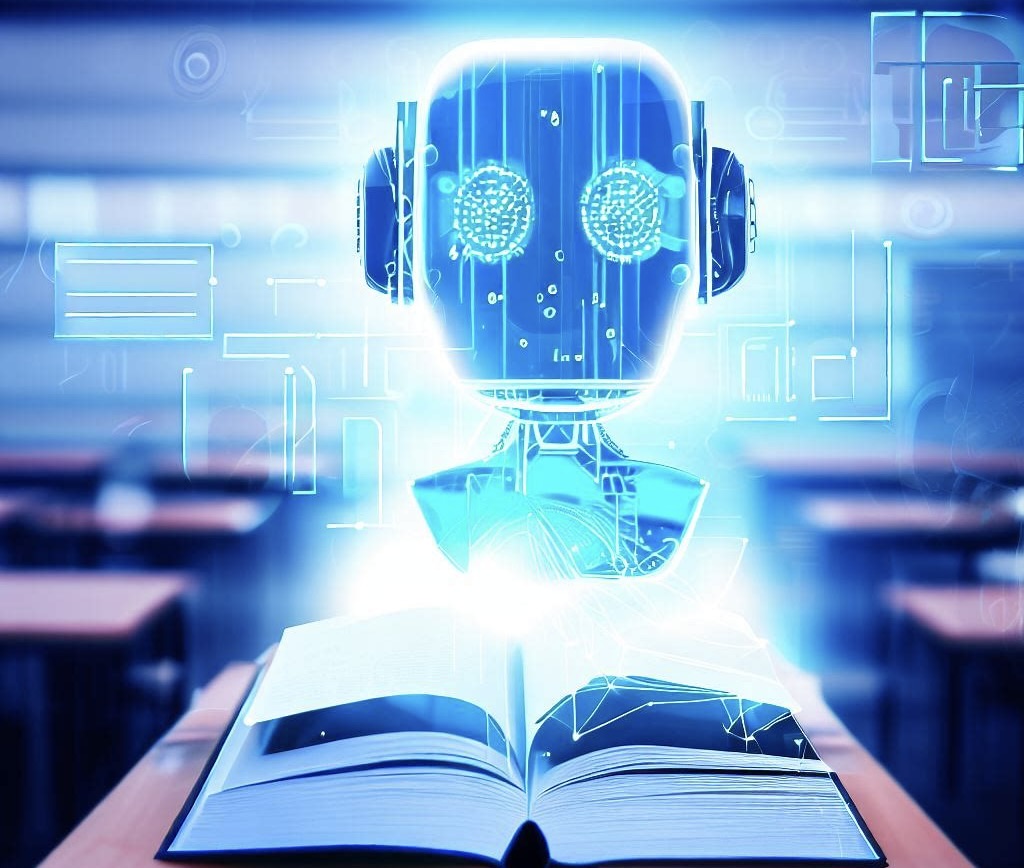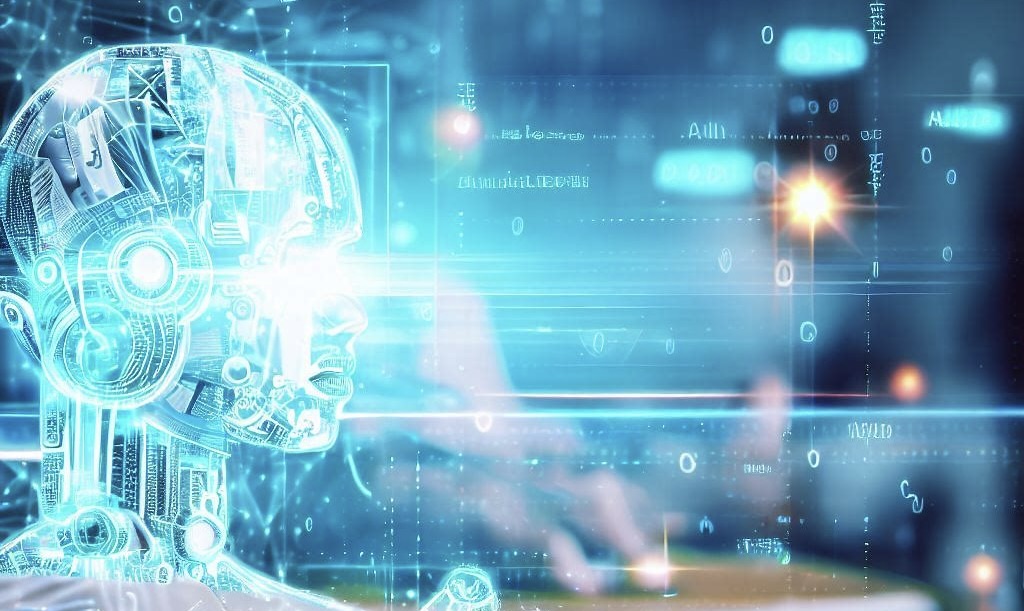How AI is Being Integrated into Today’s Education System

- August 9, 2023
- allix
- AI Education
Artificial Intelligence (AI) is progressively entering diversified arenas, the education system marking one. Breaking the monotony of the classic teaching model, educationists are welcoming AI-instigated solutions for enriched learning and efficient operations. In this exposition, we will explore the broad spectrum of AI’s use in education, evaluate its offerings, enumerate the obstacles, and look into the bright future that the blend holds.
The present-day education system benefits from AI in multiple ways. Adaptive learning software, a prime example, is redefining education. It comprehends the learner’s abilities, preferences, and speed, and customizes the content accordingly, thereby making learning a tailor-fit experience. AI-based tutors are another novelty. Students receive immediate help for their assignments, have their doubts clarified, and benefit from round-the-clock assistance. In essence, these virtual tutors serve as complementary teaching assistants.
Learning analytics utilizing AI also needs a mention. Schools and colleges use AI to collate and analyze data highlighting students’ learning and behavioral trends. Consequently, educators receive valuable feedback to fine-tune their teaching methods for maximum results.
Benefits of Integrating AI into Education
The integration of Artificial Intelligence (AI) into the education sector offers numerous benefits. This powerful technology can massively transform the education landscape, making the teaching and learning experience more engaging, personalized, and efficient.
One of the outstanding benefits of AI is the facilitation of personalized learning. Traditionally, teaching methods are generalized for all students, paying less attention to individual learning pace and abilities. However, with AI-powered adaptive learning software, every student can receive tailored content and resources based on their abilities, preferences, and learning pace. This customization ensures a perfect fit experience for each learner, bridging learning gaps and enhancing understanding. The focused attention on each learner, particularly those needing more time to grasp concepts, can revolutionize learning outcomes.
AI technology has the remarkable potential to make education more inclusive and accessible for all, including students with special needs. Innovations such as speech-to-text conversions and reading assistive tools enable students with learning disabilities like dyslexia or other reading hurdles to overcome their challenges. Assistive AI tools provide them with an equal opportunity to learn and progress alongside their peers, fostering an inclusive learning environment.
Educators often have to juggle multiple tasks, from creating lesson plans to grading assignments, thereby reducing the time spent on actual teaching. AI can relieve educators from these routine, time-consuming tasks by automating them. This automation leads to effective time management, allowing teachers to devote more time and energy to improving their teaching methods and providing quality education. AI can streamline administrative tasks such as grading assignments, marking attendance, setting quizzes, ensuring efficiency, and reducing manual errors.
AI’s role extends far beyond teaching and enters the realm of student evaluation and assessment. With AI, the assessment process can be quicker and more accurate. Advanced AI technologies can assess students’ work, provide grades, and highlight areas that need improvement almost instantaneously. Such instant feedback helps students to immediately work on their weaknesses, fostering continuous improvement and learning. The use of AI for assessments and feedback also allows for better tracking of a student’s progress over time. These benefits combined make AI a transformative force in reshaping modern education.
Challenges of AI Integration into Education
While AI presents numerous opportunities to revolutionize the education sector, integrating this advanced technology also comes with several challenges. Alongside its advantages, it presents a series of ethical and logistical concerns that need to be considered and addressed.
Top among the challenges is the issue of data security and privacy. AI systems work by collecting and analyzing vast amounts of data. In the education sector, this includes sensitive data about students’ personal information and academic records. There are legitimate concerns about how this data is stored, used, and protected. If a system is breached, students’ data can be exposed or misused, leading to serious consequences. Thus, ensuring data security and privacy is a significant challenge when introducing AI into education.
The integration of AI into education also stirs fears of job displacement among educators. The thought of AI-powered technologies replacing human teachers can be unsettling. While this fear may be somewhat exaggerated, as AI is not likely to completely replace teachers, it is a valid concern. Teachers may need to adapt to new roles and learn new technologies. The fear of AI replacing human jobs in education adds to the resistance against its integration.
Another crucial area of debate surrounding the integration of AI in education is the influence it could have on forming young minds. Education is not solely about imparting knowledge; it also includes nurturing skills, values, and perspectives. Concerns have arisen about whether AI, a non-human entity, can adequately fulfill these roles. Critics argue that AI lacks the capacity for empathy, creativity, and subjectivity, which are vital components of a holistic education.
The implementation of AI-powered tools requires substantial investment, and not all institutions have the financial resources to bankroll such projects. Therefore, the cost factor becomes a significant hindrance, widening the gap between well-resourced schools and those in low-income areas. Moreover, the lack of necessary infrastructure is also an obstacle. Many institutions, particularly those in rural or underprivileged areas, may not have the requisite infrastructure for such advanced technologies. This includes stable internet connectivity and access to devices needed to utilize AI-based tools effectively.
Despite these challenges, the benefits of AI in education suggest promise and potential for those committed to overcoming these hurdles. Efforts to mitigate these issues while capitalizing on the advantages of AI could dramatically transform the education landscape.

Future of AI in Education
As we journey forward, the future of Artificial Intelligence (AI) in education seems brimming with potential and progressive innovation. AI is poised to embed itself further into education systems, facilitating more personalized curriculums, engaging students at deeper levels, and streamlining administrative functions.
One of the key projected developments is the increased emphasis on personalized learning. AI algorithms and systems are expected to be used extensively to design unique learning paths for each student, taking into account their strengths, weaknesses, interests, and learning speed. The future may see AI gathering data from multiple sources, comprehensively analyzing it, and creating highly tailored educational content for each learner. This could dramatically improve learning outcomes and revolutionize the classroom experience.
AI is also set to enhance student engagement and participation in the learning process. Innovative AI-powered tools like intelligent tutoring systems, virtual reality environments, and interactive bots can simulate real-world scenarios for experiential learning. This means more practical, relatable learning experiences for students, which would significantly add to their interest, engagement, and understanding.
AI will further take over routine, repetitive tasks, leading to more streamlined and efficient administrative processes. Whether it’s grading assignments, scheduling classes, maintaining attendance records, or forecasting student performance, AI applications will continue to bring a higher level of efficiency and accuracy, freeing teachers up for more impactful tasks such as curriculum innovation and personal mentoring. While technology advances at a rapid pace, it’s crucial for educators and institutions to navigate the ethical implications related to AI in education. Issues related to data privacy, algorithm transparency, equity in access to AI innovations, and the roles and responsibilities of human educators in an increasingly AI-driven landscape will need active consideration and thoughtful solutions.
The integration of AI into education has the potential to reshape the industry in ways that were previously unimaginable. As we embrace AI-powered classrooms, we are looking at a future where education is more personalized, engaging, efficient, and inclusive. Accepting these changes enthusiastically while remaining alert to the implications and responsibilities will be critical in guiding the sector into this exciting new era. The onus is on educators, institutions, and policymakers to harness AI’s advancements to ensure superior, equitable, and fulfilling learning experiences for all students.
Categories
- AI Education (39)
- AI in Business (65)
- AI Projects (87)
- Research (107)
- Uncategorized (5)
Other posts
- Medical Treatment in Brazil: Advanced Healthcare, Skilled Specialists, and Patient-Focused Care
- Dental Treatment in China: Modern Technology, Skilled Dentists, and Comprehensive Care for International Patients
- Plastic Surgery in China: Advanced Aesthetic Medicine Supported by Precision, Innovation, and Skilled Specialists
- Ophthalmology in China: Advanced Eye Care Guided by Innovation, Expertise, and Patient-Focused Treatment
- Finding Care, Calm, and Confidence: Why Patients Are Looking Toward Beroun in the Czech Republic
- Choosing Health, Energy, and a New Future: Exploring Gastric Bypass in Diyarbakır, Turkey
- When Facial Hair Tells Your Story: Considering a Beard Transplant in Phuket, Thailand
- When Prevention Becomes Power: Understanding Liver Cirrhosis Risk and Modern Screening Approaches in Spain
- When the Abdomen Signals Something Serious: Understanding Abdominal Aortic Aneurysm and Getting Expert Evaluation in Islamabad
- When Back Pain Becomes More Than “Just Pain”: Understanding the Need for Microdiscectomy
Newsletter
Get regular updates on data science, artificial intelligence, machine



